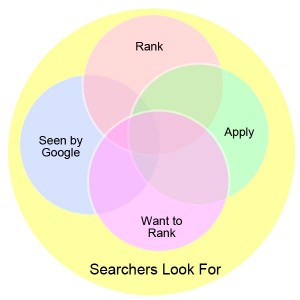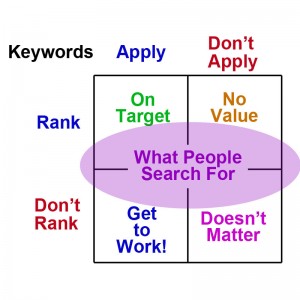 “Keyword research is one of the most important, valuable, and high return activities in the search marketing field.” It allows for better connection to your current customers and future prospects. Knowing the right keywords will allow you to be successful in your online efforts. It is no longer good enough for your business to just be online, these days you have to be found.
“Keyword research is one of the most important, valuable, and high return activities in the search marketing field.” It allows for better connection to your current customers and future prospects. Knowing the right keywords will allow you to be successful in your online efforts. It is no longer good enough for your business to just be online, these days you have to be found.
Here is the problem: Which Keywords?
(Note: When I say the word “keywords”, it can mean both a single word, or multiple words, as in a keyword phrase.)
As you delve deeper into SEO and internet marketing, you realize that sometimes there is an overlap, sometimes there is a disconnect, in the various ways keywords are used. In my mind, the image that comes up is of overlapping connections, or circles. At other times the connections between these keywords don’t exist, and the circles don’t overlap. Keywords, and their relationships to each other, can be imagined as a complex, multi-factor Venn Diagram of circles. Read on, and you will see that the more these circles overlap, the more coherent your internet marketing will be.
Circles within Circles
A business owner has an understanding of his business. As you talk with the owner you encounter the first circle: Keywords that apply to the business. You have to determine the relevant phrases that describe the business. You have to think long and hard about what your business is about, the products and services it offers. There are a lot of words in the English language that can be used. Estimates of the number of English words range up to one million!
But of course the business owner want to succeed in his online marketing, so you discover a second circle: Keywords that the business wants to rank for. What do you offer that a web searcher might look for? What are your current and future marketing goals?
So then keyword research is done, either through Google searches, or through rank tracking software, where you unearth a third circle: Keywords that the business actually ranks for, which might be slightly different circle (due to search engine algorithms/penalties) than Keywords that are seen by search engines. You can see those in Google Webmaster Tools’ (GWT) Content Keywords: “The Content Keywords page lists the most significant keywords and their variants Google found when crawling your site. When reviewed along with the Search Queries report and your site’s listing in actual search results for your targeted keywords, it provides insight into how Google is interpreting the content of your site.”
Google Webmaster Tools, under Search Queries, gives you “Impressions: The number of times pages from your site appeared in search results.”
Google also provides suggestions for you using Google AdWords Keyword Planner.
 Now remember, there is another part of the search equation of “search = your website”. Google has to provide relevant search engine results to the searcher when a person enters a word or phrase into that search bar. What phrases are they using? Those phrases are in another circle we need to ascertain, a fifth circle, Keywords that searchers look for in Google. This is the hard part, since you have to speak in your audience’s language. What wording are potential visitors using in search engines? You can use Google Auto-complete, where you type in the beginning of a word in a Google search bar, and Google gives you suggestions and tries to auto complete it for you, based on the terms other searchers have entered.
Now remember, there is another part of the search equation of “search = your website”. Google has to provide relevant search engine results to the searcher when a person enters a word or phrase into that search bar. What phrases are they using? Those phrases are in another circle we need to ascertain, a fifth circle, Keywords that searchers look for in Google. This is the hard part, since you have to speak in your audience’s language. What wording are potential visitors using in search engines? You can use Google Auto-complete, where you type in the beginning of a word in a Google search bar, and Google gives you suggestions and tries to auto complete it for you, based on the terms other searchers have entered.
Continuing on, we need to discover our sixth circle: Keywords that led searchers to you. With the rise of “not provided” in Google Analytics, Google is becoming more opaque as to exactly how, via what keyword in organic search, a visitor got to your website.
Even so, if you aren’t #1 in a search result, do your meta descriptions (text under a search link on a SERP) include calls-to-action that a searcher might think that your website will solve for them? When a web visitor comes to your website they will be asking themselves: Is this page relevant to what I am looking for? Will I find what I am looking on your site? Am I using the correct search term? Did Google give me a satisfactory answer to my question?
Phew, they finally found you! However it doesn’t end there. Will your new arrival “bounce” off your website, unsatisfied with the solution your website provides, and continue looking elsewhere? A bad user experience (UX), including navigation and design may flag your website as untrustworthy, and they may bounce for that reason, but that is a topic for another day.
What are your competitors doing?
 OK, all of that is for your website. Meanwhile there are more circles out there that we need to unearth: Keywords that your competitors rank for. Oh no, our venn diagram becomes three-dimensional!
OK, all of that is for your website. Meanwhile there are more circles out there that we need to unearth: Keywords that your competitors rank for. Oh no, our venn diagram becomes three-dimensional!
Sometimes you can learn from your competitors. What are they doing that helps them rank for a specific keyword? Sometimes you cannot learn from your competitors: “Stop Copying Your Competitors: They Don’t Know What They’re Doing Either”
SEO Marketing is a little bit like shampooing your hair: lather, rinse and repeat. Or rather: implement, test and repeat.
* How well is your KW research and analysis being applied?
* Is your marketing research finding relevant Keywords?
* Are you applying what you learned?
* What keywords work?
* What keywords didn’t work?
* How can I add appropriate keywords to my website?
Blogging and other content creation methods are great ideas for adding all appropriate relevant keywords to your website.
TL-DR: (too long-didn’t read) The most important takeaway: How well do your keyword circles intersect?
The marketing team at Orion Group take all of these circles into consideration when doing marketing research for your website. We want to help you succeed in your online marketing efforts. Call us at 262-820-9520 to find out how.
For further reading:
Keywords to Concepts: The Lazy Web Marketer’s Guide to Smart Keyword Research
+++++
NEXT MONTH:
How Long-tail keywords fit into the circles

